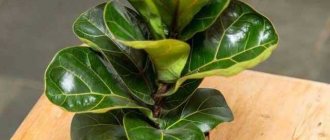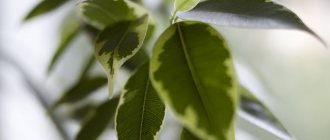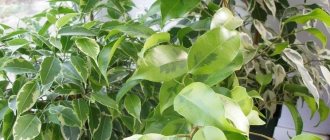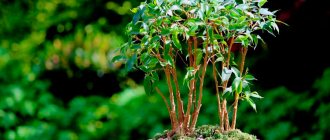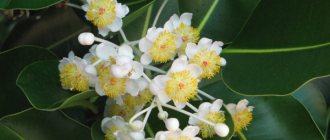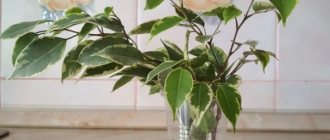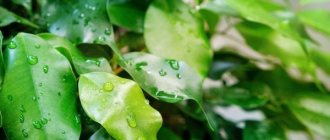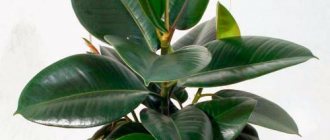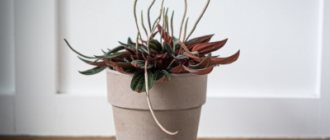Inexperienced flower growers, meeting this plant for the first time, may not recognize it as a ficus, but few of them will refuse to see it on their windowsill. Ficus Ali (Alii or Ficus Binnendijkii) is an evergreen tree of the Mulberry family. It grows naturally in Asian countries. Among all the varieties of the genus, it is the one most often chosen for landscaping residential premises and offices.
The birth of the ficus "Ali"
Ficus Ali (cv. 'Alii' or Ficus Binnendijkii) , Ficus Binnendijkii hides under its name a whole group of plants similar to each other.
In the 19th century they were discovered and described by the Dutch botanist Simon Binnendijk.
Ficus leaves are dark green and long, similar to willow leaves.
That’s why it has another name – ficus willow.
Information! The scientific name of the plant is Ficus binnendijkii , but due to difficulty in pronunciation or other reasons it is rarely used. Commonly called Ficus Alii
Ficus Alii is a fast-growing and evergreen tree that can reach up to 20 m in height in the wild.
At home, Ficus Ali grows up to 2 m.
This plant originated from the tropics of Southeast Asia and spread to an area that covers the foothills of the Himalayas, Nepal, Burma, Thailand, the islands of Java, Borneo, and Sumatra.
This ficus can grow successfully both indoors and in the winter garden.
Flower growers use different varieties of ficus.
But the varieties differ only in the width of the leaves.
VARIETIES
The plant has several derived varieties. External signs differ significantly from the usual ficus Ali, each of which is unique.
Amstel Gold - has a rich golden color. The leaves of the flower are chaotically colored yellow-green with a predominance of green. Its entire surface is covered with multiple inclusions of shades of green of various shapes and sizes. This unusual species is also called “Green Gold”.
Amstel Queen has an incredibly noble green color. The width of the leaves is between the Amstel King and Ali species. The royal splendor of the flower will give the interior a colorful and chic look.
Amstel King - original with wavy and shiny leaves up to 7 cm wide. Similar characteristics to the Amstel Queen species. It has advantages due to its ease of care. When young, the bark is a soft brown hue, when mature it is silvery.
Home care
If certain conditions are met, then Ali's ficuses will delight you with their appearance.
These are the conditions:
- illumination;
- temperature;
- watering;
- humidity;
- the soil.
Illumination
Ali are strong and unpretentious plants.
But they have their own preferences.
One of the most important is light. Plants prefer bright rooms, but not exposed to direct sunlight.
Ficus plants with variegated leaves need bright, indirect light; plants with green leaves do well in partial shade.
In winter, lighting is necessary.
Ali does not like to be moved or turned around, he is a “homebody”, so we need to find a place for him in the room, taking into account his future growth.
Temperature
The room temperature is quite comfortable for ficus plants.
In summer the optimum temperature is 20-25°C , in winter – 16-20°C.
Interesting! if the room is warm, then the plant needs more light, and vice versa, the cooler the room, the shorter the daylight hours may be. In nature, this is associated with the seasons
Watering
This flower does not like either drought or excessive moisture.
It requires regular and moderate watering, avoiding stagnation of water and waterlogging of the soil.
Experts advise watering the ficus when the top layer of soil dries 1-2 cm .
Reference! In the spring, the plants awaken and until autumn the ficus is watered more often, since at this time it is actively growing. In autumn, the plant begins a dormant period and watering is somewhat limited for the autumn-winter period.
Air humidity
For Ficus Alii , air humidity is important, so they will appreciate regular spraying.
If the plant is not large, you can wash it in the shower.
The soil
Tip: You can buy soil for the plant in the store: special soil for ficus plants or use soil for palm trees.
If you do it yourself, then for young plants you need to use the following mixture: turf, sand and peat in equal parts; adult ficuses love loose and nutritious soil
Important! Alkaline and acidic soils are not suitable for Ficus Ali!
Ficus plants need to be fed sometimes; it is optimal to do this once every 10-14 days , alternating organic and mineral fertilizers.
Ficus plants only need feeding in the spring and summer.
Reproduction
The most common way to obtain new trees is cuttings, but for grown ficuses propagation by layering is important. Instructions for both methods are given below.
By layering
This method is relevant for propagating mature ficuses. The procedure is as follows:
- On the bare part of the shoot we make a medium-sized incision;
- We insert a small stone into the incision, sprinkle the wound with hormonal powder;
- We wrap the incision with pre-moistened moss and wrap it with polyethylene on top;
- When young roots begin to emerge through the moss, cut off the shoot below the place of the winding;
- We root the seedling in a pot and grease the cut area with Vaseline.
Cuttings
Cuttings of at least 15-25 cm should be selected as planting material . long, which immediately after trimming are placed in a container with water. After two weeks, when developed roots (at least 2 cm) are formed, the seedlings can be planted in the soil.
Before planting, the substrate should be pre-steamed, otherwise the cuttings may not take root.
Photo
In the photo there is a ficus "Ali":
Are you interested in growing bright and unusual ficus trees? Read our articles about the peculiarities of growing the following varieties: Carica, De Gantelle, Pumila White Sunny, Bengal, Triangular, Microcarpa, Moklame, Eden and Amstel King.
Transfer
Transplantation should be carried out in spring or early summer for young plants annually, for specimens older than 4 years - once every 2-3 years.
In advance, you will need to prepare a substrate, drainage and a sterile ceramic or clay pot with drainage holes, 2–3 cm larger than the previous one.
The plant needs to be replanted if:
- roots have grown and are visible above the soil surface or from drainage holes;
- there has been an adaptation period after the purchase;
- the substrate needs to be replaced with a more suitable one;
- the ficus is sick or has been attacked by pests.
In case of salt deposits, as well as for mature plants above 1 m, it is sufficient to replace the top layer of soil.
Step-by-step instruction:
- water the Binnendijka and remove it from the flowerpot along with the earthen lump;
- shake off the soil, inspect the roots and cut off all damaged parts;
- Place a drainage layer 3 cm thick in a new pot and sprinkle it with soil;
- place the plant in the center of the new container;
- fill the voids with substrate so that it does not reach the top by 2 cm;
- water the flower.
Diseases and pests
Ficus Ali is good because it is almost not susceptible to diseases and pest attacks. But this happens sometimes.
Signs of the disease:
- leaves droop, look lethargic and fall: the reason is waterlogging of the soil, it is necessary to moderate watering
- plant growth slows down, leaves lose color and fall: usually the problem is a lack of light.
- the leaves of the plant dry and wrinkle: bright sunlight is to blame, shading and spraying will solve the problem
- brown spots on the tips of the leaves: the reason is high temperature or low humidity, overfeeding the plant. The issue is resolved by spraying the ficus and ventilating the room, reducing the amount of fertilizer.
The issue can be solved by moving the plant to a more illuminated place or connecting artificial lighting
Poor care of plants can lead to pests.
As a result, the following may appear on the ficus:
- mealybugs;
- scale insects and false scale insects;
- spider mites.
Mealybugs appear due to low humidity; they fight it by wiping the plants with a soft cloth soaked in alcohol.
This happens more often in winter when the batteries become hot.
Alternatively, you can hang wet towels over the batteries or place a humidifier under the plant.
When attacked by scale insects and false scale insects, ficus leaves lose their color and fall.
The insects themselves look like plaques - black or flesh-colored.
You can remove them by wiping the plant with a soft cloth and soaking it in soapy water.
In case of serious damage, actellik is used (20 drops per liter of water).
The web, white and thin, will tell you about the spider mite Spider mites do not like moisture, so it is worth rinsing the ficus in the shower with warm water several times in a row.
What kind of soil is needed?
The soil should be light, nutritious, moisture- and breathable and have weak or neutral acidity (pH 5.5–6.5).
You can avoid stagnation of water in a flowerpot using drainage made of pebbles, expanded clay or broken bricks at the bottom of the container.
Suitable ready-made soil for palms and ficuses or a soil mixture prepared independently from:
- sand;
- peat;
- humus;
- leaf soil;
- turf.
To eliminate the possibility of the presence of pathogenic bacteria and pests in the soil, before planting Binnendijka it must be sterilized by spilling it with a manganese solution or calcining it.
Expert opinion
Mokhov Andrey Petrovich
Graduated from KubSAU, specialty: agronomy
The substrate for growing a young plant can consist only of peat, turf and sand.
Benefits and harms
Considering that Ficus Ali is not a rubber plant, it does almost no harm.
You should be careful with the juice of the leaves of the plant ; if they come into contact with the skin, they can cause dermatological and allergic reactions, but the leaves of Ficus Ali are not as fleshy as those of other species and therefore the harm here is minimal.
The plant has beneficial properties characteristic of all ficuses.
It has a good effect on the microclimate of the room in which it is located.
According to popular belief, in a house where ficus grows well, people do not get sick.
And if suddenly an illness occurs, it passes easily and without consequences.
According to an old legend, if a childless woman starts growing ficus, she will soon become pregnant.
We think that this happens due to the positive energy emanating from the ficus.
Infusion of alcohol from the leaves of the plant treats arthritis, arthrosis and rheumatism.
The plant is used in the treatment of vascular, pulmonary, and skin diseases. Infusions and tinctures, compresses, and extracts are made from it.
Ficus Ali is stylish, hardy and not demanding.
It can be formed in the form of a bush or tree on a trunk, or you can do nothing, allowing Ficus Ali to simply grow.
The choice is yours. With proper care, it will decorate your home and bring you a lot of joy.
Other types of ficus can decorate your home and bring coziness to the room, including the miracle tree Ginseng, Australian Large-leaved, Asian Retuza, tropical Benedicta, capricious to care for Dwarf, cute Small-leaved, evergreen Lyrata, hanging Ampelous, popular Dull and mysterious Variethis .
Problems during cultivation
Although ficus is a low-maintenance plant, there are several common problems.
- Even the slightest stress can cause the loss of foliage - ficus trees do not adapt well to new conditions (the Ali variety does not tolerate rearrangements);
- Leaves need to be wiped regularly, as dust constantly settles on the glossy leaf blades and interferes with photosynthesis;
- Without pruning, the crown rarely branches and often simply stretches out in length, which is why it looks stubby;
- Unlike Ficus Benjamin, Ali's cuttings take root reluctantly;
- The plant reacts painfully to drafts, and since it grows actively and does not fit on the windowsill, the pot is often placed on the floor, where the flower gets sick from the flow of cold air;
- There is a temptation to place a large tree against the wall in the corner of the room - in this case, lighting is required.

